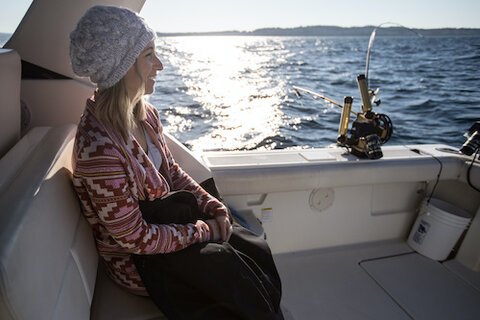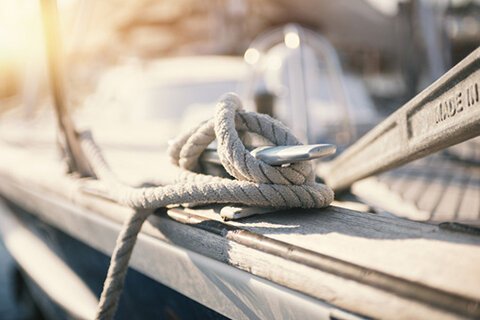|
From the U.S. Coast GuardBoating Education Branch
On the water, minor problems can rapidly develop into a situation beyond your control. For this reason, let someone know even when you are experiencing relatively minor difficulties, before your situation turns into an emergency.
 The Coast Guard serves as Search and Rescue (SAR) coordinator for all maritime emergencies and is the appropriate point of contact whenever you are concerned for your safety. If you are in distress (distress is defined as a situation where you or your boat are threatened by grave or imminent danger requiring assistance), the Coast Guard will take immediate steps to help you. Normally, Coast Guard or Coast Guard Auxiliary rescue boats and/or aircraft will be sent, but assistance from any available source will be arranged to expedite your rescue. The Coast Guard serves as Search and Rescue (SAR) coordinator for all maritime emergencies and is the appropriate point of contact whenever you are concerned for your safety. If you are in distress (distress is defined as a situation where you or your boat are threatened by grave or imminent danger requiring assistance), the Coast Guard will take immediate steps to help you. Normally, Coast Guard or Coast Guard Auxiliary rescue boats and/or aircraft will be sent, but assistance from any available source will be arranged to expedite your rescue.
How To Signal For Help
 If you are in distress use "MAYDAY, MAYDAY, MAYDAY" on the radio. If your situation is not a distress, simply call "Coast Guard." Channel 16 VHF/FM and 2182khz HF/SSB are dedicated distress and calling frequencies we monitor at all times. Citizen’s Band (CB) is not dependable and is not monitored at most Coast Guard stations. If you do not have a radio, attempt to signal a fellow boater who can assist or call the Coast Guard for you. In a distress situation, use flares or any other distress signaling device to catch the attention of another boater. If you are in distress use "MAYDAY, MAYDAY, MAYDAY" on the radio. If your situation is not a distress, simply call "Coast Guard." Channel 16 VHF/FM and 2182khz HF/SSB are dedicated distress and calling frequencies we monitor at all times. Citizen’s Band (CB) is not dependable and is not monitored at most Coast Guard stations. If you do not have a radio, attempt to signal a fellow boater who can assist or call the Coast Guard for you. In a distress situation, use flares or any other distress signaling device to catch the attention of another boater.
What To Tell The Coast Guard
While arranging help, we will ask for the following:
-
Your location or position.
-
Exact nature of the problem (special problems).
-
Number of people on board.
-
Your boat name, registration and description.
-
Safety equipment on board.
When It’s Not A Distress
The Coast Guard’s primary search and rescue role is to assist boaters in distress. If you are not in distress and alternate sources of assistance are available, we will normally coordinate the effort to assist you. If you have a friend, marina, or commercial firm that you want contacted, we will attempt to do so. You may also contact them directly on Channel 16 VHF/FM or through the marine operator.
If this effort is unsuccessful, we will make a Marine Assistance Request Broadcast (MARB) on your behalf. This announces that you need help, gives your location, and invites others to come to your aid.
If you do not accept services offered in response to the first MARB, we will:
- Provide information on other commercial firms, if available, so you may contact them directly, or
- If you request, make a second MARB to see if any other help is available.
Who Will Answer Your Call When You’re Not In Distress
 A Commercial firm may offer help. In order not to interfere with commercial enterprise (you will have to pay for these services), we normally do not provide direct on-scene assistance if a commercial firm is available to help you safely in a reasonable time. If you agree to the assistance of a commercial firm and then refuse this service when it arrives, you still may be legally obligated to pay a fee. A Commercial firm may offer help. In order not to interfere with commercial enterprise (you will have to pay for these services), we normally do not provide direct on-scene assistance if a commercial firm is available to help you safely in a reasonable time. If you agree to the assistance of a commercial firm and then refuse this service when it arrives, you still may be legally obligated to pay a fee.
- If the Coast Guard or Coast Guard Auxiliary arrives to assist you and you require a tow, they normally will tow you to the nearest location where you can either arrange for repairs or a tow back to your home port.
- In addition to Coast Guard, Coast Guard Auxiliary and commercial firms, others that may be available to assist you include a fellow boater, local fire or police department, or another public agency. Keep in mind that a Good Samaritan, although well-meaning, may not have the equipment or skills needed to help you safely and effectively.
When To Call Back
Keep in contact with the Coast Guard at regular intervals. Call us when help arrives. If someone offers help but cannot get to you within a reasonable time, usually not to exceed one hour, contact the Coast Guard to arrange other assistance. We also need to know if conditions change sufficiently to cause alarm. For example:
- A medical emergency develops.
- A storm approaches.
- You begin to take on water.
- Your last reported position changes.
Tips On Non-Distress Assistance
Unless you are familiar with the person(s) offering you help, clearly understand the type and quality of the assistance offered before accepting help or entering into a contract. Consider the following before accepting any assistance:
- Large physical stresses can occur in towing and salvage operations, risking damage to one or both boats, and personal injury.
- Does the provider have the proper equipment to handle your problem safely?
- Does the provider have the proper insurance to protect you and your vessel if he/she should cause damage or injury?
- Can the crew handle the situation safely, given the conditions and the nature of the problem?
- If a fee is being asked, does the operator have a Coast Guard license? All operators must have a license if they charge for towing services.
Provided By:
Boatsafe.com
|
 The Coast Guard serves as Search and Rescue (SAR) coordinator for all maritime emergencies and is the appropriate point of contact whenever you are concerned for your safety. If you are in distress (distress is defined as a situation where you or your boat are threatened by grave or imminent danger requiring assistance), the Coast Guard will take immediate steps to help you. Normally, Coast Guard or Coast Guard Auxiliary rescue boats and/or aircraft will be sent, but assistance from any available source will be arranged to expedite your rescue.
The Coast Guard serves as Search and Rescue (SAR) coordinator for all maritime emergencies and is the appropriate point of contact whenever you are concerned for your safety. If you are in distress (distress is defined as a situation where you or your boat are threatened by grave or imminent danger requiring assistance), the Coast Guard will take immediate steps to help you. Normally, Coast Guard or Coast Guard Auxiliary rescue boats and/or aircraft will be sent, but assistance from any available source will be arranged to expedite your rescue. If you are in distress use "MAYDAY, MAYDAY, MAYDAY" on the radio. If your situation is not a distress, simply call "Coast Guard." Channel 16 VHF/FM and 2182khz HF/SSB are dedicated distress and calling frequencies we monitor at all times. Citizen’s Band (CB) is not dependable and is not monitored at most Coast Guard stations. If you do not have a radio, attempt to signal a fellow boater who can assist or call the Coast Guard for you. In a distress situation, use flares or any other distress signaling device to catch the attention of another boater.
If you are in distress use "MAYDAY, MAYDAY, MAYDAY" on the radio. If your situation is not a distress, simply call "Coast Guard." Channel 16 VHF/FM and 2182khz HF/SSB are dedicated distress and calling frequencies we monitor at all times. Citizen’s Band (CB) is not dependable and is not monitored at most Coast Guard stations. If you do not have a radio, attempt to signal a fellow boater who can assist or call the Coast Guard for you. In a distress situation, use flares or any other distress signaling device to catch the attention of another boater. A Commercial firm may offer help. In order not to interfere with commercial enterprise (you will have to pay for these services), we normally do not provide direct on-scene assistance if a commercial firm is available to help you safely in a reasonable time. If you agree to the assistance of a commercial firm and then refuse this service when it arrives, you still may be legally obligated to pay a fee.
A Commercial firm may offer help. In order not to interfere with commercial enterprise (you will have to pay for these services), we normally do not provide direct on-scene assistance if a commercial firm is available to help you safely in a reasonable time. If you agree to the assistance of a commercial firm and then refuse this service when it arrives, you still may be legally obligated to pay a fee.
